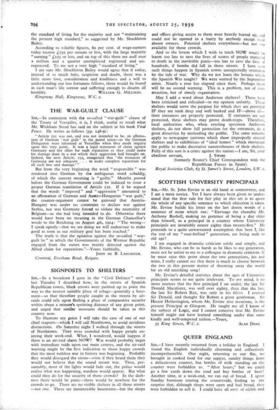THE WAR-GUILT CLAUSE
Sin,—In connexion with the so-called " war-guilt " clause of the Treaty of Versailles, it is, I think, useful to recall what Mr. Wickham Steed has said on the subject in his book Vital
Peace. He writes as follows (pp. 148-9) :
" Article 231 was not, and was not intended to be, an affirma- tion of German war guilt' in the moral sense—as the German Delegation were informed at Versailles when they made inquiry upon this very point. It was a legal statement of claim against Germany and her allies for such reparation as they could make for damage done in a war which their aggression had brought on. Indeed, the next Article, 232, recognised that ' the resources of Germany are not adequate . . . to make complete reparation for all such loss and damage.' " But from the very beginning the word " responsible " was rendered into German by the ambiguous word schuldig, of which the current meaning is " guilty." Months passed before the German Government could be induced to issue a proper German translation of Article 231. If it be argued that the words " imposed " and " aggression " amounted to an affirmation of German and Austro-Hungarian " war guilt," the counter-argument cannot be gainsaid that Austria- Hungary was under no constraint to declare war against Serbia, nor was Germany forced to violate the neutrality of Belgium—as she had long intended to do. Otherwise there would have been no meaning in the German Chancellor's words to the Reichstag on August 4th, 1914: " The wrong— I speak openly—that we are doing we will endeavour to make good as soon as our military goal has been reached."
The truth is that the agitation against the so-called " war- guilt lie " in which the Governments of the Weimar Republic engaged from the outset was mainly directed against the Allied claim for reparations."—Yours faithfully,








































 Previous page
Previous page